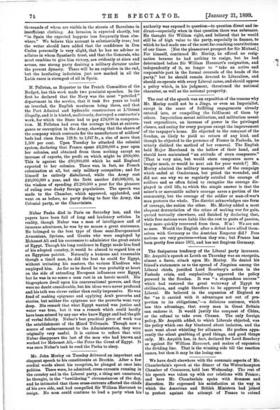Mr. John Morley on Tuesday delivered an important and eloquent
speech to his constituents at Brechin. After a few cordial words about his reception, he plunged at once into politics. There were, he admitted, cross-currents running in the country and in the Liberal party, a thing not unnatural, he thought, in the " bewildering " circumstances of the day, and he intimated that those Gross-currents affected the chiefs of his own side, and had compelled Sir William Harcourt to resign. No man could continue to lead a party when his authority was exposed to question—to question direct and in- direct—especially when in that question there was substance. He thought Sir William right, and believed that he would still be of high value to the party, especially in finance, to which he had made one of the most far-reaching contributions of our times. [Not the pleasantest prospect for Sir Michael.] For himself, continued Mr. Morley, be offered no resig- nation because he had nothing to resign, but he had determined before Sir William Harcourt's resignation, and independently of it, no longer to " take an active and responsible part in the formal counsels of the heads of the party," but he should remain devoted to Liberalism, and should co-operate with every Liberal cause, and should oppose a policy which, in his judgment, threatened the national character, as well as the national prosperity.


































 Previous page
Previous page